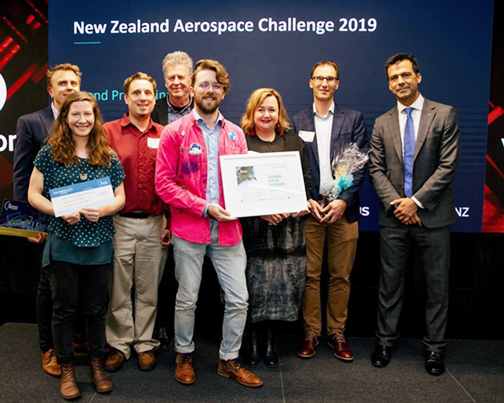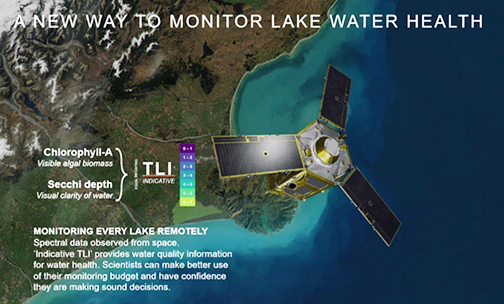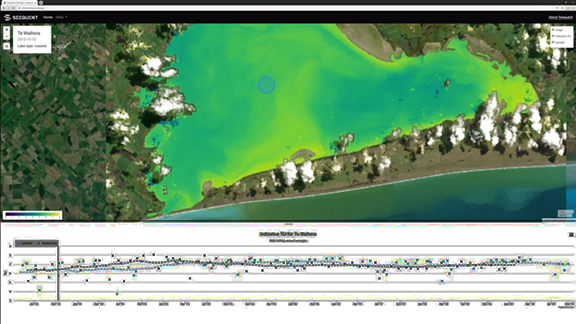
Seequent is developing a satellite-based remote sensing solution that could virtually monitor the water quality of every lake across the globe.
Seequent’s Lake Indicator Modelling System (SLIMS) can capture water quality data across many hundreds of lakes at once and model and visualize it through time, to help freshwater scientists identify lake health changes as they occur.

The Seequent team accept the NZ Aerospace Challenge award from Hon Dr Megan Woods, Minister of Research, Science and Innovation (third from right) and Valentin Merino Villeneuve from Airbus (far right).
Seequent was awarded the grand prize at the New Zealand Aerospace Challenge 2019 after demonstrating how its globally scalable SLIMS solution could effectively and economically monitor the health of all New Zealand’s 3,820 lakes. With currently only 2 percent of lakes currently monitored via established methods of lake water sampling and analysis, SLIMS enables organisations to monitor changes in lake conditions with the ability to use historical satellite data to identify seasonal trends. This allows users to identify lakes exhibiting any unexpected change for closer monitoring and management.
The Challenge, powered by global aerospace giant Airbus, and delivered by ChristchurchNZ and SpaceBase, sought solutions to identify, monitor or measure water or soil pollution using satellite data and unmanned aircraft technology.

Seequent’s multi-disciplinary team, which included collaborators from Lincoln Agritech and the Waterways Centre for Freshwater Management, also received support from Environment Canterbury and the University of Waikato. The team received a cash prize of $30,000, over $15,000 of Airbus data vouchers, $2,500 of legal support and an offer of commercialization support from Xstart, a tech focused incubator based at the University of Canterbury's Centre for Entrepreneurship.

Indicative TLI water quality information for Te Waihora in the Canterbury region of the South Island of New Zealand
shown in SLIMS.
To encourage future aerospace breakthroughs in New Zealand, Seequent donated their cash prize back to the Challenge organizers to be used for future challenges, or as seed funding for small businesses in the aerospace industry.
Daniel Wallace, Seequent GM for Civil and Environmental, said the company jumped at the opportunity to participate in the Challenge to apply their innovative technology above ground in an exciting new space with huge potential to positively impact sustainability. He said water quality and the health of the lakes sustains life. It’s not economical to visit all lakes to monitor adverse environmental impacts, but with satellite remote sensing, every lake can be monitored virtually. Algal blooms, sediment events and other adverse changes in lake health, which could otherwise be unseen and unknown suddenly emerge with our new monitoring solution. Subsequently, these lakes could be visited to further investigate the health degradation.

